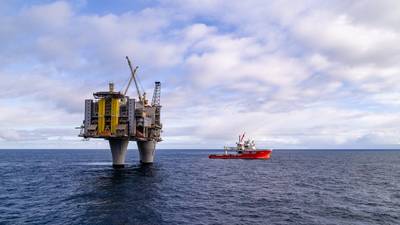Equinor Suspends 2020 Production Guidance
Equinor has suspended its 2020 oil and gas output guidance amid government-imposed curtailments and a glut of supply, and could take further action to scale back activity this year, the Norwegian energy firm said on Thursday.
With operations from the North Sea to Africa, the Americas and Asia, Equinor had expected 7% output growth this year before Norway, Brazil and others joined OPEC+ in ordering curtailments amid the COVID-19 pandemic.
"We will continue to prioritise value over volume and have already reduced activity, particularly in the U.S. onshore. We will consider further activity reductions and use the flexibility we have in our portfolio as necessary," Chief Executive Eldar Saetre said in a statement.
Equinor, however, maintained its long-term forecast for average output growth of 3% per year in the period from 2019-2026, after reporting a record 2.23 million barrels of oil equivalent per day (boepd) production in the quarter.
The 3% year-on-year rise in quarterly output was mainly due to the ramp-up of its Johan Sverdrup oilfield, the largest in Western Europe, which reached phase-one plateau production of 470,000 barrels per day in late April, it added.
Equinor reiterated its plan to cut capital spending to $8.5 billion this year from $10 billion in 2019, and said it now expected spending for 2021 to be at about $10 billion from a previous view of $10 billion to $11 billion.
Adjusted earnings before interest and tax (EBIT) fell to $2.05 billion in the first quarter from $4.19 billion in the same period of 2019. A poll of 29 analysts compiled by Equinor had forecast adjusted EBIT of $2.0 billion.
Equinor had already cut its quarterly dividend by two-thirds to $0.09 per share, becoming the first major oil company to do so after oil prices crashed to their lowest in more than two decades.
It had also suspended $5 billion share buy-back programme, and slashed its capital, exploration spending and operating costs by a total of $3 billion.
Equinor last cut its dividend payment during the financial crisis in 2008-2009. During the previous oil market downturn in 2014-2016 it opted to pay part of the dividend in shares instead of cash.
On Wednesday, the company divested its 4.88% stake in Swedish rival Lundin Energy for 3.3 billion Swedish crowns.
The company reported a $0.71 billion net loss after taking net impairments of $2.45 billion due to a reduction in the short-term oil price outlook.
Equinor now expects the average Brent oil price in 2020 to be at $31 a barrel compared to the previous view of $59 a barrel.
(Editing by Terje Solsvik; Editing by Stephen Coates)









